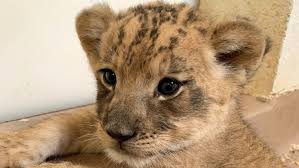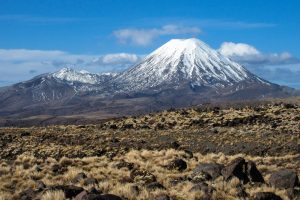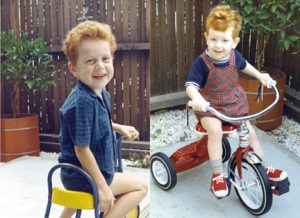Posts Tagged ‘family’
Sitting down with lions
In many cultures, humans see themselves as siblings to other living beings. In Aotearoa New Zealand, where I grew up, the Māori people recognize landforms such as mountains and rivers as their relatives. Even in Western Judeo-Christian societies, where humans are believed to have been make in God’s likeness and to have dominion over all creatures (Genesis 1:26), people with beloved domestic pets may discover that their relationship is closer to that of peers than of master and subject.
My own views, which come closer to those of scientific pantheism, had a formative moment one summer day in the early 1970s, when my friend Judi and I took our children to the Oakland Zoo. I tell about it in a letter to my parents:

A lion cub recently born at the Denver Zoo. Image from the Denver Post.
The biggest thrill of the day, I got to cuddle a lion cub. Little 7 week-old roly-polies, they had been separated from their mother – I gather the father was threatening to harm them in the cramped quarters of the adult lions. We happened to be there at bottle time, and the keepers brought them out to a low platform in the children’s zoo. They obviously need lots of affection. I was sitting on the platform, and one of them just crawled into my lap, like a kitten or a puppy.
I will remember always the roughness of the cub’s fur under my hand, the warmth of his tiny body, the loudness of his purr, the overwhelming sense of awe that this wild creature trusted me. Here’s a poem about the incident:
The Lion Cub
In the dusty heat of the zoo
a lion roars.
I conjure a dream of Africa
an endless veldt
an alien majesty
concealed in yellow grass.
At the petting zoo
three lion cubs
explore a patch of dirt.
I sit.
One crawls into my lap
nuzzles my hand.
Under thick baby fur
muscles ripple, relax
curl up for a nap.
Wide-eyed, the children watch
and touch.
Distance evaporates.
We are earth family
connected deep in time
in mother love.
Night train in winter

New Zealand’s Volcanic Plateau in daytime. Image from https://www.flyingandtravel.com/skiing-north-island-whakapapa-ruapehu/
An image haunts my mind like an old song in a minor key. From a train window late at night, a desert plateau spreads into the distance. In the foreground, scattered clumps of tussock, stiff with frost, emerge from a dusting of snow. On the horizon, three volcanic cones gleam white against the blackness. The scene is both bleak and beautiful. Tranquil even. A calmness fills me as I remember.
The year was 1968, the place the center of North Island, New Zealand, somewhere north of Ohakune on the Main Trunk Line. I was traveling by train, alone, to a funeral.
It had been a tense few months since my husband and I, with two young children, had decided to make the trip back to New Zealand, our home country, to visit our families. First there was boundary-setting to do with my mother on how much relation-visiting I would allow her to inflict on my shy infants. A few weeks prior to our departure date the children developed chickenpox, one after the other, pushing our schedule further into New Zealand’s winter and upending an itinerary that carefully divided our limited time between my husband’s family and mine. On arrival, I discovered my mother had sabotaged this division by taking a motel room in my mother-in-law’s town. Each day she ensconced herself in mother-in-law’s tiny living-room, dragging my embarrassed father and school-age sister with her. Other sisters later told me they’d remonstrated with her, but she’d insisted she had a right to see her long-gone daughter as soon as I arrived. My mother-in-law was gracious, but I was furious on her behalf.
Then fate intervened. On a night of heavy rain, my maternal grandmother’s husband stepped from between parked cars into the path of an oncoming truck. I did not know my step-grandfather, since he and grandma married about the time I left for college. But grandma had been an important part of my childhood, and she loved this man, so it mattered that I go to the funeral. Leaving the children with their father and his mother, I set out on the overnight journey. First a railcar from New Plymouth, on the west coast, which connected at Marton with the Night Limited express that ran each night between Auckland and Wellington.
I knew this train, having ridden it back and forth many times when I was in college. There was comfort in the familiar sway and smell of the overheated, stuffy carriage, the faded red plush covering high-backed seats, the clackety-clack of the wheels. There was peace too. For the first time since the children were born I was alone, with no responsibilities.
Beyond the desert and mountain vista on the Volcanic Plateau, the chuff and grind of the diesel engine became more labored as the narrow-gauge track rose into a more broken landscape, with forest a dark overhang outside the window. Then Taumarunui Station at 2:00 am, the refreshment stop, where bleary passengers streamed into the tea-room for meat pies or slabs of yellow pound cake and milky tea in thick white china cups. Sometime around dawn, a stop at Te Kuiti where relatives met me for the two-hour drive to Tauranga, where the funeral was to be held. Calmed by the journey, I willingly renewed acquaintance with uncles and cousins and aunts I’d argued with my mother about seeing.
Looking back, I understand what that spare, snow-covered landscape was telling me: that the land is vastly more important than human quarrels, that I needed to let go of my day-to-day tensions and anxieties and become merged with the wholeness of the earth.
Uncles & cousins & aunts, oh my!
Recently, while reading Michael Krasny’s new book, Let There Be Laughter, I came across the Yiddish word naches, which Krasny defines as “the joy and pride a parent derives from a child’s accomplishments.” High on a mother’s list of accomplishments for her daughter would be the production of beautiful grandchildren. It was an ‘Aha!’ moment. I’d been re-reading some of my 1967-68 letters to parents (my mother saved them all and gave them back to me) and thinking about the strained mother/daughter relationship the letters revealed.
The occasion was our first visit back to New Zealand. It had been seven years since we left our birth country, and twelve years since I had spent more than a week or two with my parents. In the meantime I had earned an advanced degree, begun a career as a writer, married, moved to England, had a couple of children, moved to California. I had kept in touch faithfully through fortnightly letters but had had none of that face-to-face interaction that helps define a relationship.
I was wildly excited about the trip:
18 Sept. 1967
I have a bit of news that I have been saving up, partly because I still scarcely believe it myself – we are hoping to come for a visit to NZ about the middle of next year, probably in May. It will only be for a month – you get a cheaper excursion rate for 28 days – but hope that will be long enough to see everybody again, & for the children to sort out who all the vague names of grandmas, uncles, etc. are – David [our 4-year-old] has them hopelessly confused at the moment.
1 Oct. 1967
[On news that sisters & cousins were having babies] It will be fun to meet all these new members of the family – they certainly seem to be mounting up.
31 Oct. 1967
[re Christmas presents] Like you, finance is a bit low this year – as you can imagine, we are needing to save very hard for this trip.
My next letter has a firmer tone. With the help of a marriage & family therapist friend (thank you, Linda G.), I’ve been researching the psychology of mother/daughter relationships and discovered the Jungian concept of individuation, the process of becoming aware of oneself as a being separate from one’s parents. I also learned that tensions are normal in the parent and adult child relationship during this process of separating and setting boundaries.
17 Nov. 1967
I gather that preparations are already being made for our homecoming in May. I hope you realise that our time is going to be extremely limited. We hope to divide most of it between you & [my husband’s mother], but also must go to Christchurch for a few days, and also have friends around the country that we hope to visit. So you would do well to reckon on about a week (don’t forget flying time is included in the 28 days). This week will have to include relations too. The plan for an open day or weekend sounds a good one. I had better make it plain from the start that, apart from our immediate brothers & sisters, and possibly grandparents if they are too infirm to travel, we are not going to do any relation-visiting. For one thing, it wouldn’t be fair to the kids, dragging them round from one set of strange faces to another. If you are going to get to know them at all, which from our point of view is the purpose of the visit, we will need a quiet domestic atmosphere with as few strange faces as possible. It took David four months to adjust to living in this country. Also, two days of being an exhibition piece is about as much as T. or I could stand – we are pretty unsociable types!
Here’s where the Yiddish concept of naches comes in. Looking back, I realize now that it mattered deeply to my mother to be able to show us off. She had never seen our children, her first grandchildren, other than in photographs, and she had idealized them. But as a young mother, I was having none of it:
5 Dec. 1967
Glad you see my point about visiting relations, though reading your letter again I have a suspicion that you intend to have them turning up all the time anyway. If this is so, please think again. I know, Mum, you love to have your family about you, and find it hard to understand my attitude. But to me my family is my husband and children, and next, my parents and brothers and sisters. Now I shall be delighted to meet all my uncles and my cousins and my aunts, but since practically all of them are almost total strangers, it would be much easier on us to restrict their visits to a definite two days, and leave us free for the rest of the time to do what we came for, which is to visit you.
In my psychology reading I came across another concept, filial maturity, explained as:
1) By early adulthood, particularly in the 30s, taking on the responsibilities and status of an adult (employment, parenthood, involvement in the community), the child begins to identify with the parent.
2) Eventually, the parent and child relate to each other more like equals.
When I wrote these letters about our forthcoming trip to New Zealand I was 29. After fifty years of being a mother and a grandmother, I now understand why my mother and I were at odds. I’m sorry she had to deal with such a difficult and demanding daughter. I also know this was the way it had to be.
Mother and Child
My new great-niece came to visit this week. At ten weeks old, Baby Jessica smiles and gurgles. “Being a mother is different from what I expected, my niece Angela says. “I thought I’d spend all my time looking after a helpless baby. I didn’t realize I’d be getting to know a little person.”
I watch the two of them as they gaze into each other’s eyes, and am overwhelmed by the miracle of that mother-child bond.

